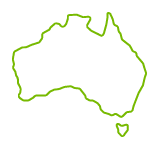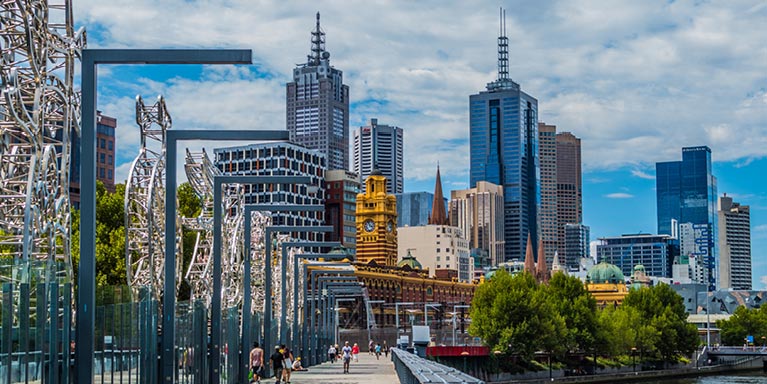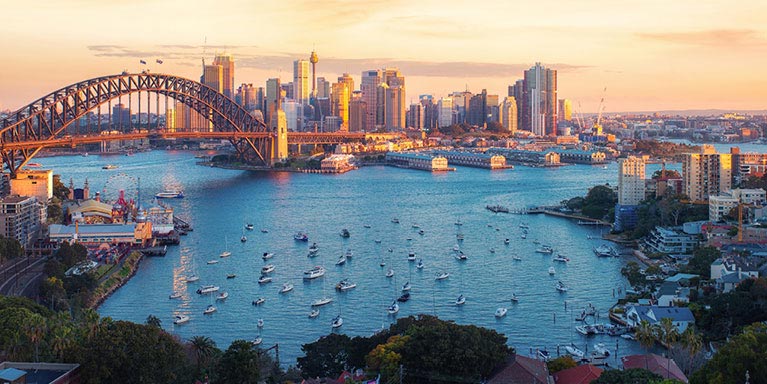
A guide to Australia
Our expert view on expat life down under

Australia is a popular destination – with its warmer climate, laid-back attitude and excellent work-life balance. And we’ll be by your side as you embark on your latest adventure. In this guide, we’ll look at the things that are good to know to help you quickly settle into your new lifestyle.
- Population: Almost 26 million
- Currency: Australian dollar (AUD)
- Capital: Canberra
- Biggest city: Sydney
- Main language: English
- Main religion: Christianity
- Political system: Federal parliamentary constitutional monarchy
- International dialling code: +61
- Emergency services: Dial 000 for police, fire and ambulance services. You'll find other 24-hour emergency numbers online and in your local phone directory
- Driving: On the left, like the UK
-
Careers
Most expats don't move to Australia to progress their careers. But, with a stable economy, low unemployment and the highest minimum wage, it can be a good reason to stay longer. The salaries on offer in Australia are often generous, and normally more than enough to compensate for the generally higher prices.
Education
Australian education and children's development is highly rated. Most children attend government-funded public schools within their catchment area, which can push property prices up in areas with highly rated schools, as in the UK. There are also few private schools, but with long waiting lists and high fees. Most faith schools are Catholic-run and can be a more cost-effective option than sending children to fully private schools. There aren’t many international schools, but you can still find a selection of independent schools offering an international education and qualifications. Again, these don’t come cheap.
-
Moving money
Putting the right banking arrangements in place is vital for expats around the world. You want to be able to access and transfer money easily, and with a bank you can trust to comply with international regulations. Most people have two banks – in their home country and local to where they’re living. But, if your bank has a global network, you may be able to set up an account ahead of your arrival, which gives you time to assess the financial market.
It’s important to understand how foreign exchange works and how fluctuating exchange rates can affect you. When you’re juggling finances in multiple currencies, remember that the currency markets can move quickly and make a big difference to the value of your money.
To help you reduce the risk of fluctuating currency, you could choose a foreign exchange that lets you fix an exchange rate for a fixed period of time. Then you’ll know exactly how much you need to convert, whatever happens in the market.
Budgeting
When you’re looking to move to a new country, you need to consider how a change in the cost of living could affect your finances. If you’re moving with your job, sometimes your employer may help with expenses, such as accommodation or school fees, but a lot of these perks have been cut back recently due to the economic downturn. Remember to account for setup costs, such as buying furniture or a car and arranging insurance, when you’re thinking about your budget.
Costs
Some of our offshore accounts have a monthly fee, such as the International Current Account, whereas others, like the Premier International Account, don’t. Both offer fee free International Payments (correspondent and recipient bank charges may apply) and 24/7 worldwide access. Plus, the Premier also includes worldwide travel insurance for you and your family, which is underwritten by AWP P&C SA and administered by Allianz Assistance, which is a trading name of AWP Assistance UK Ltd. Eligibility criteria, terms and conditions apply.
Financial planning
While it’s going to be a busy time, it’s also worth setting some time aside to review your financial plans, such as whether you want to open any offshore accounts. They offer the convenience of keeping your money in one place, so you can stay with the same bank no matter where life takes you.
Your expat status could give you new opportunities that weren’t available to you at home. However, tax rules differ from country to country, so if you’re unsure about your personal tax obligations, you should seek professional advice.
Lloyds Bank International Private Banking is by your side every step of the journey as you start your new life abroad. We offer international knowledge, experience and dedicated expert support to help meet all your financial needs. From savings to international payments and transfers, we can help you navigate the complex world of wealth management away from home.
Security
Offshore accounts are not protected by the Financial Services Compensation Scheme (FSCS), which protects savings up to £120,000 with authorised UK banks and building societies.
However, our accounts are covered by other schemes. The Jersey Bank Depositor Compensation Scheme, the Isle of Man Depositors’ Compensation Scheme and the Guernsey Banking Deposit Compensation Scheme offer protection for eligible deposits of up to £50,000.
Tax
You’ll need to pay income tax for personal income like salary and wages, self-employment income, business income and capital gains. The tax authority is the Australian Taxation Office (ATO), and the tax year runs from 1 July to 30 June, with the tax return date of 31 October.
You should apply for a tax file number (TFN) so that the right amount of tax can be withheld from your wages. If you run a business, you should apply for an Australian business number (ABN). The bank and/or your employer will ask for these, and if you don’t provide a TFN or ABN, you’ll be charged the highest rate of income tax. You can apply for a TFN or ABN online.
Australia has a double tax treaty with many countries, including the UK. You can apply for an offset so that you aren’t charged twice.
There is also a Medicare Levy for residents that is charged at a rate of 2%, which is for health services. Higher income resident taxpayers may need to pay an additional 1-1.5% surcharge, but lower income taxpayers may not have to pay the levy or could pay a reduced amount. The percentage to be paid will be dependent on the upper and lower thresholds.
In Australia it’s compulsory for employers to pay a minimum percentage of employee earnings into a private superannuation (a pension). For both residents and non-residents – if your total taxable income and superannuation contributions are more than the threshold, you may need to pay Division 293 tax. Income or superannuation contributions over the threshold is taxed but can be paid by the individual or deducted from the superannuation contributions.
For more information about taxes, visit www.ato.gov.au.
Accommodation
Australian housing is usually of high quality, with many having garages, gardens and swimming pools. Apartments and townhouses are also common in the bigger cities.
Temporary furnished apartments are widely available in most cities, as most agencies won't let you rent or buy a property until you've viewed it. So, while you can start looking online, you can't get anywhere to live until you've arrived.
The rental market moves quickly due to high demand. It might be worth taking relevant documents to viewings in case you want to sign up immediately. Usually, you'll have to put down a deposit of four to six weeks' rent. Then you’ll have to pay quarterly utility bills in addition.
Arts
Whether you’re interested in modern or indigenous art, you’ll find it all around the country. The South Australia Art Gallery in Adelaide has lots of amazing sculptures; the Art Gallery of Western Australia in Perth has over 3,000 Aboriginal works; Sydney has the Museum of Contemporary Art and Melbourne has the National Gallery of Victoria. So, wherever you’re heading, you’ll see some stunning pieces.
Best places to live
At 3 million square miles, Australia has plenty to offer, whatever your interests. Prices are relatively high in the cities, but comparable to many large UK and US cities.
If you like attending cultural events and enjoy fine dining from around the world, then Melbourne might tick a lot of those bohemian boxes. Adelaide is more affordable and offers plenty of leisure activities for families. If sunshine and surfing are more your thing, then Brisbane and the Gold Coast could be the perfect place for you.
With its iconic landmarks and fabulous beaches, Sydney is a stunning city and has the most job opportunities. Perth has large areas of green space for that outdoor lifestyle you’ve dreamed about and, for that reason, attracts many expats. Then further afield, you’ll find plenty of characterful smaller towns or places deeper into the outback if you want to be among nature.
Culture
Fairness and equality are the values that form the foundations for much of Australian life and how people relate to each another in general.
People of all genders often share the responsibilities for earning a living and carrying out the household chores.
Australians are generally known for being down to earth and friendly, placing a high value on camaraderie or ‘mateship’. The weather and space encourage an active outdoor lifestyle from the coast to the outback and they love sport from cricket and rugby to the various types of football.
Food
Australian cuisine blends the best fresh local ingredients with influences from around the world to create something unique. You’ll discover an incredible variety of cooking from the famous barbecues, Greek-style lunches by the sea or sampling Melbourne’s pan-Asian flavours. There are also 65 wine regions and a growing number of artisan distilleries and craft breweries, so you should always find the perfect tipple to accompany your meal.
Health
Australia's public healthcare system, Medicare, is regarded as excellent and is free for citizens and permanent residents, funded by the government. It may be prudent to take out medical insurance until you reach that stage. There are many private healthcare providers with tax incentives to encourage people to do so. Chemists can dispense prescriptions, and offer free advice on minor ailments, with some open 24/7. The emergency medical services are state-run and usually very efficient.
Pets
Restrictions are tight on importing pets. Only dogs and cats can be brought into the country, and they must be microchipped and vaccinated. They’ll also be quarantined for a minimum of 10 days on arrival. You’ll also need to provide documents as proof of vaccination and microchipping, and have a valid pet passport or health certificate.
For more information on importing cats and dogs into Australia, visit the Department of Agriculture, Fisheries and Forestry website. You’ll find details on acceptable types of microchips and step-by-step guides to importing your pet.
Restricted items
There are strict import controls to protect Australia’s biodiversity. Banned or restricted items include endangered plant and animal species, pesticides, drugs and narcotics, weapons, asbestos and tobacco.
Shipping
Air and sea freight are both expensive, but the country's ports are well run and usually hassle-free. You can import household goods duty-free as long as you've owned them for 12 months (you may need receipts or insurance documents as proof).
Time
There are three time zones: Eastern (GMT+10), Central (GMT+9.5) and Western (GMT+8). In all states except Queensland, the Northern Territory and Western Australia, clocks move forward an hour in October and back an hour in April.
Transport
Due to its size, domestic flights are the most popular way to travel. There’s a large choice of local airlines offering frequent flights at competitive prices. The highways are generally good between the big cities, but be prepared for long journeys taking into account fuel and food stops, especially if you’re not travelling on major routes. If you're not a permanent resident, you can use your licence from home as long as it hasn't expired. Permanent residents can use a foreign licence for three months before converting to an Australian licence.
Rail travel is another way to explore Australia, but the services tend to be infrequent and not particularly fast. Buses are cheap, but obviously take longer than other modes of transport.
Lloyds International takes no responsibility for the accuracy of this information. It is provided for orientation purposes and to stimulate further research, not as advice. We advise that you independently verify any details and make decisions based on your own assessment. It is crucial you are aware of and comply with any relevant laws in your host country or country of origin.

Melborne
The capital of Victoria, and second largest city in the country, is renowned for its vibrant cultural scene and hosting major sporting events.

Sydney
The most populus city and capital of New South Wales contains some of Australia’s most famous landmarks. It has a booming economy, wide range of cultural events and festivals, and is home to some of the world’s most beautiful beaches.